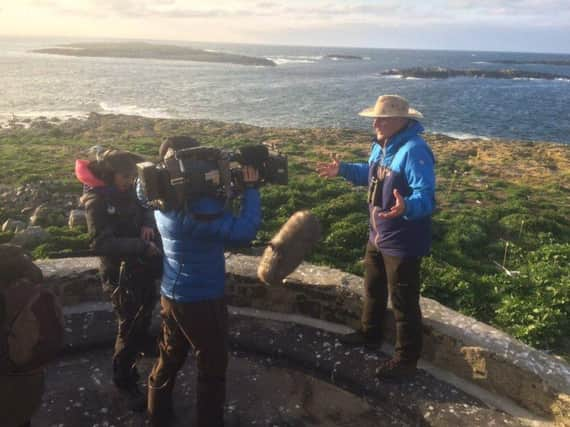Farne Islands feature on BBC Springwatch
This article contains affiliate links. We may earn a small commission on items purchased through this article, but that does not affect our editorial judgement.


The BBC’s popular Springwatch returns on Monday and reporter Iolo Williams has made the islands his home for the three weeks of the broadcast.
He'll be bringing viewers the best spectacles of the season, including the breeding puffin population and the Atlantic grey seal colony.
Advertisement
Hide AdAdvertisement
Hide AdDaily updates will be broadcast on BBC2 from Monday until June 17, as presenters Chris Packham, Michaela Strachan and Martin Hughes-Games showcase the best wildlife action this spring has to offer.
Home to more than 85,000 breeding pairs of seabirds and one of the largest colonies of Atlantic Grey Seals (4,000), the Farne Islands are looked after by the National Trust and, in particular, a hardy team of rangers who spend up to 10 months of the year living there.
Gwen Potter, National Trust countryside manager for the Northumberland coast, said: "At this time of year, the Farne Islands are unlike anywhere else in the UK. Sir David Attenborough himself described them as 'the UK’s greatest wildlife experience'. Not only are the islands an incredible place for humans, but they are of course a safe haven for the birds where they can breed in relative safety.
"Hopefully viewers will get a flavour of what it’s like to live and work on the islands and if we’re lucky, see up close how puffins nest in burrows to bring up their chicks – the fantastically named pufflings. This is always the busiest season on the islands and we’re very excited to have the BBC with us, sharing incredible updates with the people watching at home."
Advertisement
Hide AdAdvertisement
Hide AdThe rangers balance the conservation needs of the islands with enabling access for visitors. They are internationally important for breeding seabirds and have to be managed accordingly.
Ranger Ed Tooth said: "Vegetation management takes up most of our time, as we look to maintain current suitable habitat and also create new areas. We also monitor the population of every species that breeds, which involves counting around 85,000 pairs of birds. Most we count on the nest, and some, like the puffin census, we only carry out every five years as it is such a mammoth task. We also count all the grey seal pups that are born in October to December.
"But the islands also provide a visitor experience unlike any other. Immersing yourself in a world of seabirds is amazing, and we help people make the most of their visit by keeping them safe and educating them about what they are seeing, whilst managing that access to protect the breeding birds."
The Farnes will be open as normal for visitors while the BBC is filming for Springwatch. Boats sail daily (weather permitting) from Seahouses. For more information, visit www.nationaltrust.org.uk/farne-islands